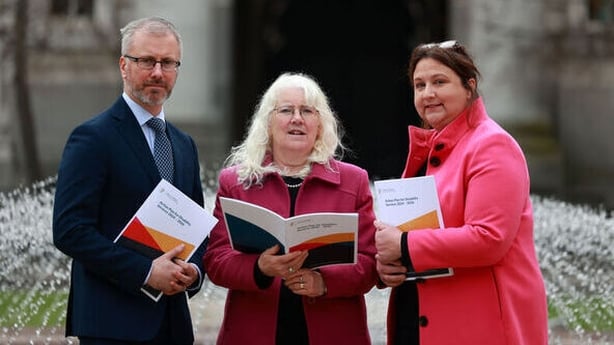Some 900 new residential support packages will be provided over the next three years through the Government's Disability Services Action Plan 2024 - 2026.
Five hundred people are due to receive support to move from congregated settings to community based living.
The plan, which was launched at lunchtime, sets out a range of actions designed to provide better access to disability services, to maximise the impact of service delivery through "strategic change" and to enable better planning and management through improved information and systems.
There are more than 1,500 families with parents over the age of 70 providing residential support to adults with intellectual disabilities, while more than 2,000 people remain in congregated settings or in nursing homes, due to the current lack of residential support packages.
Over 300 houses are estimated to be required under the plan announced today, to house those seeking residential spaces.
Speaking at the launch the Minister for Disabilities Anne Rabbitte said its implementation would require input and commitment across Government, including from the Department of Housing.
The planned expansion of residential services will require significant capital investment in order to provide the necessary housing.

The plan says that key priorities for the 2024 to 2026 period include measures to increase capacity in children's disability services, expand respite services, provide extra residential places and provide extra home support and personal assistance services.
While €2.9 billion in funding was allocated to specialist disability services in 2024; €64m was allocated by the Department to fund measures under the first year of the plan.
The majority of the actions in the plan will be delivered through the HSE and voluntary services providers, funded by the HSE.
HSE CEO Bernard Gloster welcomed the plan but acknowledged it will require lot of effort to implement it.
Asked why the plan was launched on the last day of the Dáil before Christmas recess, the Minister for Children Roderic O'Gorman said it was due to the transfer of Disability to his Department.
This took place in March 2023.
He said the commitment was to publish the plan in 2023 and there would be time to debate the action plan when the Oireachtas returns next year.
The plan also contains cross governmental actions including in areas such as maintaining links to mainstream health-services, pathways to employment and delivery of increased residential services, to ensure joined-up thinking and an all-of-Government approach.
The National Federation of Voluntary Service Providers has urged the Government to significantly invest in the Disability Action Plan to ensure severe unmet need is addressed.
It welcomed the development of the action plan which aims to ensure that the allocation of residential supports are no longer on an emergency-only basis.
There have been concerns for some time that the responsibility for residential support has largely been left with the families of people with intellectual disabilities, many of whom are older parents.
The Federation said the "current approach" had failed to realise the rights of people with disabilities as under the UNCRPD, to live with supports in the community and this had left people and their families in great distress, with no access to a planned future.
Chief Executive Alison Harnett said that while the allocation of €64 million in the first year of the plan was welcome, she said the Federation remained "very concerned" that the level of funding would not provide thousands of people with disabilities and their families who have no access to planned supports, with the support needed.
"A greater level of investment will be required in successive budgets to adequately respond to the significant unmet need outlined in the Disability Capacity Review," she said.
The Disability Capacity Review which was published in 2021, and the Action Plan launched today describes more than 4,400 people with disabilities living with significant unmet residential support needs, more than 18,000 children on waiting lists for Children's Network Development Teams, and a growing need for therapeutic services and supports.
Chair of the National Federation, Clare Dempsey, said significant political will across all parties and collaboration across Government Departments is required to ensure the plan is implemented.
She stressed the need for required investment "to ensure that the unmet needs of people with intellectual disabilities and autism become a priority".
'Lack of ambition'
There is insufficient focus on disability services delivered by voluntary organisations in the Government's Action Plan according to the Disability Federation of Ireland (DFI).
In a statement the DFI said the Action Plan did not "acknowledge or recognise" that voluntary organisations provide up to 70% of supports in the community.
"There was a missed opportunity with shared principles of partnership developed by the Government in collaboration with statutory bodies and voluntary organisations, published in April, which could have been a fundamental element of the plan," it said.
The DFI has described "a lack of ambition" in some areas of the plan, including supporting 260 people under the age of 65 living in nursing homes, move into the community by 2026.
"Given that there are over 1,250 people under 65 living in nursing homes, this is not an ambitious enough target.", it said.
The DFI pointed out that realisation of the UNCRPD was not solely the responsibility of DCEDIY, and the HSE and required a whole of Government approach.






